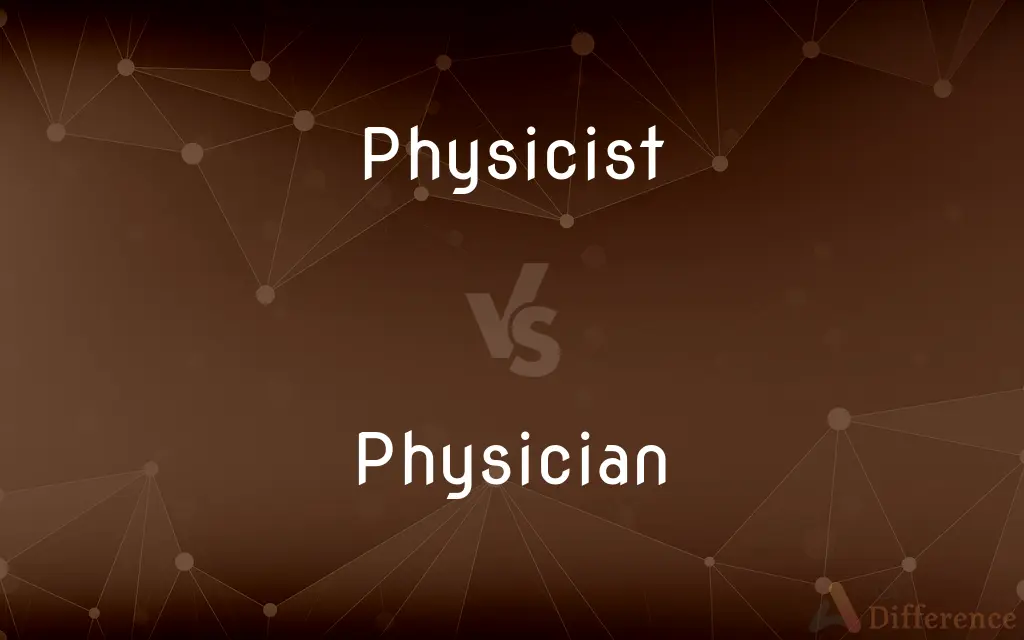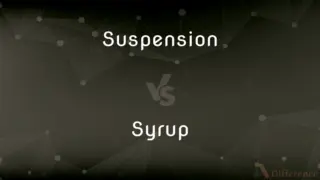Physicist vs. Physician — What's the Difference?
By Tayyaba Rehman — Updated on October 14, 2023
A Physicist studies the fundamental properties of the universe, while a Physician is a medical doctor treating diseases and injuries in humans.

Difference Between Physicist and Physician
Table of Contents
ADVERTISEMENT
Key Differences
A Physicist delves deep into the intricacies of the physical universe, exploring the laws of nature and the behavior of matter and energy. On the other hand, a Physician focuses on diagnosing, treating, and preventing diseases in patients.
While Physicists often work in research labs, academic settings, or industries, using experiments and theoretical models to understand the universe's phenomena, Physicians primarily work in hospitals, clinics, or private practices, directly interacting with patients and providing healthcare.
The tools of a Physicist might include particle accelerators, telescopes, or computer simulations. In contrast, a Physician employs medical instruments like stethoscopes, blood pressure monitors, and diagnostic machines.
Education paths differ significantly between the two. A budding Physicist might pursue degrees in physics or related fields, ultimately aiming for a Ph.D. Meanwhile, an aspiring Physician undertakes medical school after undergraduate studies, followed by residency and possibly specialization.
While both Physicists and Physicians contribute profoundly to society, their impacts manifest differently. A Physicist might develop a new technology or contribute to our understanding of the universe, while a Physician directly saves lives and improves patients' health.
ADVERTISEMENT
Comparison Chart
Primary Focus
Studies properties of the universe
Treats diseases and injuries in humans
Typical Workplace
Research labs, academic settings, industries
Hospitals, clinics, private practices
Tools Used
Particle accelerators, computer simulations
Stethoscopes, diagnostic machines
Education
Degrees in physics, often Ph.D.
Medical school, residency, specialization
Impact
Technology development, understanding universe
Saving lives, improving health
Compare with Definitions
Physicist
An expert in the field of physics.
The Physicist received an award for groundbreaking research.
Physician
A medical doctor specialized in diagnosing and treating diseases.
The Physician prescribed some medication for the patient's condition.
Physicist
A scientist studying the principles of matter and energy.
The Physicist proposed a new theory about dark matter.
Physician
An expert in the medical field providing patient care.
The Physician discussed potential treatments with the patient.
Physicist
A researcher working on the fundamental laws of nature.
The young Physicist was passionate about studying black holes.
Physician
A healer who practices Western medicine.
The Physician examined the patient's symptoms and ordered tests.
Physicist
One who conducts experiments to understand natural phenomena.
The Physicist set up an experiment to test quantum mechanics.
Physician
A doctor offering therapeutic solutions for ailments.
The concerned parent consulted the Physician about their child's fever.
Physicist
An individual who develops theories about the physical universe.
The famous Physicist wrote several books on string theory.
Physician
A physician (American English), medical practitioner (Commonwealth English), medical doctor, or simply doctor, is a professional who practices medicine, which is concerned with promoting, maintaining or restoring health through the study, diagnosis, prognosis and treatment of disease, injury, and other physical and mental impairments. Physicians may focus their practice on certain disease categories, types of patients, and methods of treatment—known as specialities—or they may assume responsibility for the provision of continuing and comprehensive medical care to individuals, families, and communities—known as general practice.
Physicist
A physicist is a scientist who specializes in the field of physics, which encompasses the interactions of matter and energy at all length and time scales in the physical universe. Physicists generally are interested in the root or ultimate causes of phenomena, and usually frame their understanding in mathematical terms.
Physician
A person trained and licensed to practice medicine; one who has a Doctor of Medicine or a Doctor of Osteopathic Medicine degree.
Physicist
A scientist who specializes in physics.
Physician
(Archaic) A person who practices general medicine as distinct from surgery.
Physicist
A person whose occupation specializes in the science of physics, especially at a professional level.
Physician
A person who heals or exerts a healing influence.
Physicist
(archaic) A believer in the theory that the fundamental phenomena of life are to be explained upon purely chemical and physical principles (opposed to vitalist).
Physician
A practitioner of physic, i.e. a specialist in internal medicine, especially as opposed to a surgeon; a practitioner who treats with medication rather than with surgery.
Physicist
One versed in physics.
Physician
A medical doctor trained in human medicine.
Physicist
A believer in the theory that the fundamental phenomena of life are to be explained upon purely chemical and physical principles; - opposed to vitalist.
Physician
A person skilled in physic, or the art of healing; one duty authorized to prescribe remedies for, and treat, diseases; a doctor of medicine.
Physicist
A scientist trained in physics
Physician
Hence, figuratively, one who ministers to moral diseases; as, a physician of the soul.
Physician
A licensed medical practitioner;
I felt so bad I went to see my doctor
Physician
A licensed practitioner of medicine.
The Physician worked long hours at the local hospital.
Common Curiosities
What is the main responsibility of a Physician?
A Physician's main responsibility is to diagnose, treat, and prevent diseases in patients.
Would a Physicist perform surgery?
No, a Physicist is not trained to perform medical procedures. That's the role of a surgeon, a type of Physician.
Are all Physicians surgeons?
No, not all Physicians are surgeons. There are many medical specialties, and only some involve surgery.
Can a Physicist write prescriptions for medications?
No, only licensed Physicians can write medical prescriptions.
What does a Physicist primarily study?
A Physicist primarily studies the properties and behavior of matter and energy.
Can a Physician work in a research lab?
Yes, some Physicians work in research, developing new treatments or studying diseases.
What might a Physicist study in space research?
A Physicist might study phenomena like black holes, cosmic radiation, or the properties of distant planets.
Who might explore the properties of a new material, a Physicist or a Physician?
A Physicist would typically explore the properties of a new material.
What's the difference between a Physicist and an engineer?
While both might work on technology, a Physicist focuses on fundamental scientific principles, whereas an engineer applies those principles to practical solutions.
Is a pediatrician considered a Physician?
Yes, a pediatrician is a Physician specializing in children's health.
Do Physicians need to study physics?
Physicians study basic physics, especially in topics related to human biology and medical technologies, but not as extensively as Physicists.
Who might be more involved in nuclear research, a Physicist or a Physician?
A Physicist would typically be more involved in nuclear research.
Do Physicists conduct medical research?
While Physicists may contribute to medical technologies, they generally do not conduct medical research. That's typically done by biomedical researchers.
How long does a Physician train before practicing medicine?
A Physician typically completes 4 years of medical school followed by 3-7 years of residency, depending on the specialty.
Share Your Discovery

Previous Comparison
Suspension vs. Syrup
Next Comparison
Contractee vs. ContractorAuthor Spotlight
Written by
Tayyaba RehmanTayyaba Rehman is a distinguished writer, currently serving as a primary contributor to askdifference.com. As a researcher in semantics and etymology, Tayyaba's passion for the complexity of languages and their distinctions has found a perfect home on the platform. Tayyaba delves into the intricacies of language, distinguishing between commonly confused words and phrases, thereby providing clarity for readers worldwide.













































